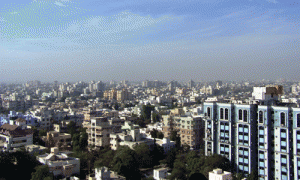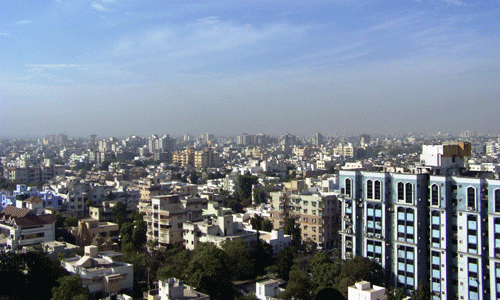By: Ravi Sinha
 Track2Realty Exclusive: While the Vijay Kelkar Committee has strongly advocated in its recommendation to the Central Government that monetisation of the government land can finance the basic urban infrastructure needs, a move in that direction has set the tone for a fresh debate in Maharashtra.
Track2Realty Exclusive: While the Vijay Kelkar Committee has strongly advocated in its recommendation to the Central Government that monetisation of the government land can finance the basic urban infrastructure needs, a move in that direction has set the tone for a fresh debate in Maharashtra.
The Maharashtra government has revised lease rentals of a total of 1,577 properties situated in Mumbai city and suburbs. The revised lease rentals, which are fixed on ready reckoner rates, would be effective from January 1. State cabinet chaired by Prithviraj Chavan gave its approval at its meeting held on Tuesday, Oct 9.
A number of these lands have been allocated at nominal rents for lease terms that extend to 90, 99, and 999 years. Some have even been allocated in perpetuity. These include lands allotted to various gymkhanas (most of them situated in South Mumbai), hospitals, and educational and religious trusts, housing societies, business houses, among others. The government is expected to get well over Rs 500 crore due to the revision in lease rentals.
As per the cabinet decision after taking into consideration 25% share of the government as a lessor 2% lease rental would be charged on residential, 4% on industrial, 5% each on commercial and residential/commercial mix properties. The renewal of lease rentals has been done for next 30 years and it would be increased by 25% after five years.
Further, lease rentals have been proposed for lands wherein they would be converted into occupancy right from lease rental. Lands, whose lease was either over or it would end in next 10 years, would be entitled for such conversion. Residential properties would now have to pay conversion fee of 20% of the market rates, 25% of the market rates for industrial, 30% of the market rate for commercial properties. In case of residential and commercial mix properties the conversion fee would be based on area under usage.
Making this announcement Maharashtra Chief Minister Prithviraj Chavan said, “These lands were given on lease rentals at a time when there was comparatively less demand for land in Mumbai. The lease rentals in some cases are Rs 45 per annum, Rs 100 per annum. This is quite low compared to present prices of properties in the city. There has been 921.91% rise in the value of lands in last 80 years in Mumbai.”
The proposed increase of rent and the premium of granting long term leasehold lands on freehold basis would be the matter of bargain during the process of hearing. After giving hearing, government is at liberty to keep the lease rent as proposed.
Chavan recalled that the government had released a policy to revise lease rentals based on market rates in October 1999. However, it was subsequently challenged in the Bombay high court. The government withdrew its decision in November 2006. The present revision has been done as per the high court order.
However, the real estate industry bodies seem to be pretty upset and some of the developers even calling the move as catalyst to price appreciation across the Mumbai city. Developers’ apex body CREDAI has criticized Maharashtra Government’s revised land lease policy for Mumbai. Lalit Kumar Jain, National President CREDAI says the government needs to reconsider this decision as it will only add to the woes of the real estate sector in India.
“I am surprised at the Maharashtra Government’s decision to increase lease rates and decrease the tenure of the lease. This move will further pressurize the real estate market, which is already suffering from poor demand. Lessees will now shy away from the market due to shorter tenure and increased lease rates. The revised policy is against the affordable housing principal and it will put a lot of pressure on the home buyers,” says Jain.
MCHI-CREDAI, the representative body of developer community in the state has also cribbed that the new land lease policy will hit common man.
Paras Gundecha, President MCHI-CREDAI says, “This move will have far reaching effects on the rental and lease property market in Mumbai. Maharashtra government’s decision to allow land to be given on lease only for 30 years will put potential leases in a quandary. Moreover, the increase in lease rates will have an adverse effect on the rental and lease property market in Mumbai. In an economy which is already reeling under market pressures, this move will further affect the buyer sentiment.”
Beyond the critique of the government efforts to monetising land, the developer seems to have no solution to offer as to how to finance the urban infrastructure needs. A city like Mumbai crumbling under infrastructure deficit, load on basic urban infra components is only going to increase in time to come. Harmit Chawla, Managing Director of HCorp Realty, however, defends Maharashtra Government’s move calling it a rational step against the land sharks sitting over prime government properties by paying peanuts.
“It is a progressive step according to me. I recommend monetisation of government land across the major urban centres of India since that is one pragmatic way to fund the infrastructure deficit. It sounds a step to price hike only when you look at it only from the interest of one stake holder-real estate developers. But the step, if rightly implemented without money being pocketed by the greedy politicians, has a far reaching impact. I don’t even subscribe the theory of price appreciation because the step is not going to change the demand & supply dynamics of a city like Mumbai,” says Chawla.
The moot point remains whether the holistic solution theory will be bought by the real estate developers in any of the urban centres across the country. Maharashtra has taken the first lead for Mumbai and by all means the theory will have an acid test in the city, beyond the support or criticism that the move has invited.





